- Home
- David Lubar
Strikeout of the Bleacher Weenies Page 13
Strikeout of the Bleacher Weenies Read online
Page 13
Someone spoke the expected words before Deborah had a chance to exhale.
“Hey, what’s she doing here? She’s a girl.”
Deborah stared at the speaker. He was a grubby little boy, maybe five or six years old, dressed in a miniature tuxedo with a too-large top hat on his too-large head. A red clip-on bow tie appeared and disappeared beneath the loose flesh of his wagging jaw like an upside-down version of a bobbing apple. His face had been scrubbed and polished, but he still looked grubby. His mother, who was straightening the top hat, made a minor attempt to shush him, but he continued to broadcast his opinions.
“Girls don’t do magic. Magic is for boys.” The last word came out sounding like “boyzes.”
I was right, Deborah said to herself, less than a minute and they’ve started. She’d have guessed the first snub would have come from one of the boys her own age, but it didn’t surprise her that a younger boy had spoken up. She felt all the other eyes shift toward her. The boys, as nervous as they must have been, turned away from their cards and doves and rabbits for a moment to glare at this girl who dared to practice their craft. She was used to boys acting this way, but Deborah expected better from the mothers. They were women. They should have known how it felt. They should have understood. But they joined their sons and stared at her with the scowl reserved for invaders of sacred turf.
“Girls don’t do magic,” the boy said again, looking up toward his mother.
The mother gave a small nod.
“This girl does magic,” Deborah said, speaking quietly, and more to herself than to the angry figures that stared at her. She wove her way to the far wall, knowing most of the eyes were still following her. I’m glad I didn’t wear the dress, she thought. That would have given them even more to stare at. Deborah knew she looked enchanting in the evening gown. She could be enchanting—that was no problem. But she’d decided to go with a modest blouse and black slacks. When she got onstage, she wanted to be judged on her skills. She didn’t want to score points based on any gifts of birth.
As Deborah reached the corner farthest from the stage, she could hear drifting bits of whispered exchanges. Bursts of locker-room laughter rose from random spots as boys made their stupid comments. Deborah fought her urge to strike out at them. It would be so easy to let her rage win. For a moment, she savored the thought of lashing back. But that wasn’t why she’d come. The North American Magician’s Association was the largest magic organization in the country. If she could win the junior contest, she knew people would have to take her seriously. This was her last chance for the juniors—once she turned thirteen, she’d have to compete with the adults. And as much as she dreamed of winning first place in the adult division, she knew that it was a whole different world from the juniors.
Deborah blocked out the lingering chatter as she set down her kit. Unlike the boys, she’d come alone. Her mother had left the city on business last night, taking another of her many midnight flights.
“Break a leg, kid,” she’d said when she’d given Deborah a hug for luck. “But make sure it isn’t one of yours.”
Deborah didn’t mind looking after herself. She wasn’t lonely. She had her cat at home, and her books.
As she prepared her equipment, she scanned the room, trying to spot the real competition. From the props she saw and the practice moves the boys were running through, there didn’t seem to be anyone she couldn’t beat, based on talent alone. But, at shows like these, talent never stood alone. The little kid would be a problem. The judges always favored the youngest contestants, even if they had no real talent. A small kid badly performing simple tricks from a cheap magic kit could almost always score better than an experienced twelve-year-old performing difficult effects. Other than the little kid, Deborah saw nothing to worry her. Most of the contestants were just hobbyists.
It won’t hurt to give them a bit of a scare, Deborah thought. She reached into her kit and took out a deck of cards. The deck disappeared. Then it reappeared. She fanned the deck with one hand, spreading the cards smoothly. The deck, still fanned, disappeared again, only to reappear one card at a time. Not bad, she thought. There weren’t many kids her age who could back-palm a whole deck. There weren’t even that many adults who could perform the sleight this smoothly.
I’m good, Deborah told herself. I’m very good.
Still, this one flourish wasn’t enough to make her stand out as the very best. Deborah took the effect a step further. She held up another deck in her left hand. Making a special effort to ignore her audience of sons and mothers, she repeated the sequence, but this time she did it with both hands at once. Cards appeared and disappeared with grace and flare. Months of practice, hours each day in front of a mirror, were the only secret here.
“Man, she’s good,” someone whispered.
“Ssshhh,” someone else said. “She’s not that good.”
Keeping her expression neutral, Deborah stashed the cards in her pocket and picked up a green sponge ball from her kit. She rolled it across her fingers, savoring the way it waltzed on the dance floor of her hand. She tossed the ball up in the air, then caught it. She tossed it again. It changed color. She tossed it a third time. One ball rose into the air—two balls fell. She repeated the sequence with both hands. “Just a girl,” she said to no one in particular. I’m a lot more than just a girl, she thought, allowing herself a small smile, but they’ll never know the real me.
Something else grabbed Deborah’s attention. She dropped the sponge balls back into her kit as the announcer walked in and spoke to the contestants. “Okay, kids, let’s get this show going.” He read off the order of appearance from a sheet on a clipboard. Deborah was next to last. That was a good sign. In the old days, the top act—the headliner—always went on next to last. Deborah wondered whether any of the boys in the room had ever bothered to study the history of their art. The position near the end also allowed Deborah to see almost all of her competition before she performed. The snotty little kid was the only one who would go on after her.
“I want a soda,” he said to his mother.
Speaking of little brats, Deborah thought as she glanced over at him.
“Quiet, Abner,” his mother said, “the show is starting.”
“I WANT A SODA!” he shouted, his mouth getting large enough to eclipse half his face.
“Yes, darling,” his mother said, digging frantically in her purse for change. “Mommy will get you a soda.” She hurried off.
Deborah shook her head. This kid was a real brat. She turned her back on him and joined the fringes of the crowd as they watched the show from the side of the stage. The first kid wasn’t bad, but he was obviously a beginner. He looked nervous, and he didn’t know how to use the microphone. He kept talking as he moved around, so his voice would fade in and out. Deborah knew the judges would kill him for that mistake. They said Houdini had the lung power to work without a microphone—but this kid wasn’t Houdini. The next two acts weren’t any better, or any worse. Each boy did a few tricks he’d probably just bought off the shelf at a magic shop. Each boy received polite applause.
But Deborah loved magic so much, she didn’t even mind watching beginner magic. There was something she could learn from any performance. And there was something wonderful about the art. Deborah found great beauty in creating the illusion of magic through skill and cunning. And, despite what these kids said or thought, there had been many successful female magicians. But mostly, women were stuck walking around in ridiculous costumes, wiggling their flesh while handing out swords and taking away doves.
Deborah’s dream was to change all that. Nobody was going to saw her in half. She wanted to become the world’s most famous female magician. Not just female, she reminded herself as she thought about her goal. She wanted to become the world’s most famous magician, period. And she wanted to do it through hard work, practice, and skill. No tricks or shortcuts for me, she thought as she watched another act. The kid was doing some fancy flourishes with a
deck of cards, but it was a trick deck where the cards were threaded together. Deborah knew that any good magician in the audience would immediately spot the gimmick. And the judges were all excellent magicians with years of experience. Deborah wasn’t going to take the easy way. No gimmicks, no fancy equipment, no special help of any kind.
She watched the next boy. He moved well. Deborah suspected he had a natural talent—but not for magic. He might have made a wonderful dancer, or maybe a mime. He made an adequate magician, but she knew he’d never rise beyond the level of birthday parties and talent shows. Deborah shook her head—she understood quite well that the talent a person was given at birth wasn’t always the talent that brought happiness. She had other skills, herself, but magic was where her dream lay.
“You’re next,” the announcer told her as the boy onstage finished his act with a decent version of the torn-and-restored newspaper routine.
This was when the real butterflies always hit. Deborah knew the panic would fade the moment she started to perform. But for now, she had to live with the spasms that rippled through her stomach. She rushed back and grabbed her kit from the far corner where she’d left it, then walked onto the stage. As always, the instant she felt the bright lights above her head and the hardwood floor beneath her feet she knew this was where she belonged. She set her kit on top of a stool and reached inside for the silk handkerchief she used for her first effect.
A cold shock stopped her.
Deborah’s fingertips dipped into a slimy mess. Bubbles tingled against her skin.
“What…?”
She stood frozen for a moment, not understanding. Then she knew. Realization and anger flooded her at the same time. Someone had poured soda on her equipment. Everything was a sticky disaster. There was nothing she could do. There was no quick way to repair the damage. It was beyond her power. A high-pitched giggle struck at her from the wings. Deborah saw the little beast peering at her from the shadows at the side of the stage. He bounced from foot to foot, almost dancing in delight.
Deborah wanted to strike back. But the audience was waiting. She could sense them nearing that moment when a crowd’s attention turns from excitement to boredom or—worse yet—to pity. Another instant, and she knew she’d lose them. In the few minutes allowed for each act, there was no way she’d ever win them back if she let them slip away now.
The cards! She had two decks in her pocket. Deborah wiped her hand on her pants, then reached into her pocket. Be your best, she thought. As soon as her fingers felt the familiar surface of the pasteboards, she slipped into her rhythm—each hand dancing a slow waltz with fifty-two life-long friends. Within seconds, the crowd was captured by her spell—a spell woven from nothing but two hands and two decks of cards.
They were hers. She was magic.
Nothing stood in her way. Every flourish was perfect, every effect was flawless. As she reached her ending, Deborah knew she had stunned them with her skill. Feeling like a figure skater approaching her hardest jump, she pointed to a man in the audience. “Name a card.”
“Six of clubs,” the man said.
She pointed to a woman. “Another card, please.”
“Jack of hearts,” the woman said.
Deborah repeated the names, then threw the two decks into the air, above her head. As the cards rained down, she thrust her hands into the fluttering cloud. Then she lifted her hands high in triumph, the six of clubs grasped in her right hand, the jack of hearts in her left.
Perfect, she thought. It was perfect.
Deborah smiled and bowed. The audience went wild. They clapped and cheered and stomped their feet. The sound embraced her like her mother’s hugs. Even some of the boys watching from the wings clapped for her. Deborah waited until the applause showed the first signs of dying, then bowed again and turned to leave the stage.
“Girls aren’t magicians?” she whispered, smiling even wider.
She said it again as she moved behind the curtain, hurling the words like a missile at one small target.
“Big deal,” the boy said as Deborah glided past him. “Watch me.” He strutted onto the stage, puffed like a rooster who thinks the hen house is the entire world.
Deborah knew he couldn’t be any good. He had too much hatred inside of him to be a real magician. Magic was born of calm and confidence. But she was still worried. The judges could fall for him because he was little.
He started off well. The crowd liked him, even though he was less skilled than any of the other boys. He made coins appear and disappear. He did it just poorly enough that Deborah was sure the judges thought he was cute.
Deborah studied the judges. They were grinning and nodding at each other. One judge whispered to the man next to him. From where she stood, it looked like he’d said, “Isn’t he adorable?”
For a moment, Deborah closed her eyes and squeezed her hands into fists, reminding herself of her vow. She would win through skill and not trickery. She wouldn’t win with gimmicks or by draping herself in a slinky dress or using any unfair powers. Deborah wanted an honest victory.
You don’t always get what you want, she reminded herself as she watched the little kid. And life is rarely fair.
Deborah told herself she should just wait and take her chances. But the boy had played a rotten trick on her. She couldn’t help aiming bad thoughts toward him. He was so nasty that some of what he’d done to her would surely have to come back around eventually and bite him. Deborah just wanted the biting to start right away.
“Drop them,” Deborah whispered. She unclenched her fists.
There was a clatter as the boy dropped a handful of hidden coins. He made a joke about it. The crowd laughed. He started his next trick. He cut a rope in half. “Mess up, you little brat,” Deborah whispered.
The boy waved his hand over the rope. It was still in two pieces. He looked puzzled, but he made another joke. The crowd laughed, but not as hard as before.
It got worse. Every trick went wrong. Toward the end, even Deborah felt sorry for the brat. But, as the announcer called her onstage to take her trophy for first place, she stopped thinking about the boy altogether.
In her hands, the trophy was like a cup that could hold unlimited dreams and hopes. It was hers, and she had earned it. Her vow, though bruised, remained unbroken.
As she left the stage, she saw him again. His top hat was on the floor, crushed under his foot. His bow tie had been flung across the room. He looked up at her and said, “You just won ’cause you’re a girl.” His mother was not in sight. Deborah figured she was probably off on another errand for her little darling.
“Girls aren’t magicians,” the boy told her.
Deborah bent down close to him and put her mouth next to his ear. “That’s going to change,” she said quietly. She hesitated, glanced around, then said one thing more. “And you forgot something, you stupid little boy. Maybe you think girls aren’t magicians. But even a silly little brat like you must know that some girls are witches. I couldn’t fix the mess you made of my equipment. I’m not that powerful, yet. But making someone turn clumsy—that’s not hard at all. I could do that when I was three. I can do even more now.” She touched his lips with her right forefinger and whispered a final word.
“Silence.”
Then she laughed and walked away.
She almost felt pity for him. Without looking back, she knew he was standing there with his mouth open and his face frozen in surprise. For the moment, the world would be spared from having to hear him. His voice would come back in an hour or two. As for his clumsiness, Deborah suspected it would last a while longer. Eventually, it might wear off. But, for the moment, it looked like some boys weren’t destined to be magicians, either.
THE QUILTY CLOWN
The life of the average six-month-old baby is pretty sweet. Quentin, who was slightly above average in many ways, but still just an infant, was no exception. He got fed, he got hugged, and he got loved. Life was definitely sweet. At least, that’s how
it was before the quilty clown showed up.
He heard about it, first, before he saw it. Quentin couldn’t talk all that much, yet. Mostly, he burbled and cooed. He hadn’t figured out how to make all of the sounds his parents made, and he was still learning what words were all about. But he understood what he heard.
Dinga-chinga-dinga-bing.
That was the doorbell. Quentin loved hearing the bell. It was like music. And it meant someone was coming for a visit. Visitors were wonderful. They leaned over his crib and smiled. They adored him. They tickled his belly and sang songs to him.
“Hello, dearie.”
Quentin smiled. He knew that voice, even when the speaker was all the way across the house. Faraway voices were softer. But this one was still recognizable. It was Mrs. Pepson, from across the street.
“Hello,” his mother said. “What do you have there?”
“Something for the precious little one,” Mrs. Pepson said. “I saw it at a garage sale, and I just knew your little boy would love it.”
For me, Quentin thought. Even though he didn’t hear his name, he knew he was also the little boy. He burbled. He wanted to say, “Yay!” but he hadn’t quite mastered that word, yet. Besides, burbling conveyed his feelings perfectly adequately.
He heard footsteps coming his way. Sounds got louder when they got closer. His mom and Mrs. Pepson reached the crib.
“Look, Quentin,” his mom said, holding something up. “Mrs. Pepson brought this for you. Isn’t it wonderful?”
Quentin laughed and clapped his hands. His mom was holding a quilt. It was filled with bright colors. Quentin knew all about quilts, since he slept with one that covered him and kept him snug, and he took naps on the couch on another one that his grandma had made for him.
But this quilt was different. Instead of squares and triangles, it was a clown—a big, smiling clown, with a huge red mouth, a red-and-blue-striped shirt, white gloves, yellow pants, and enormous black shoes. One raised hand clutched strings tied to a bunch of balloons. The other hand pointed straight out, as if to say, “These are for you.” The quilt was stretched over a frame.

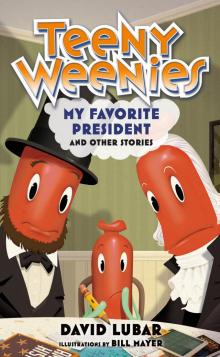 Teeny Weenies: My Favorite President
Teeny Weenies: My Favorite President Teeny Weenies: The Intergalactic Petting Zoo
Teeny Weenies: The Intergalactic Petting Zoo Teeny Weenies: The Eighth Octopus
Teeny Weenies: The Eighth Octopus Emperor of the Universe
Emperor of the Universe Teeny Weenies: The Boy Who Cried Wool
Teeny Weenies: The Boy Who Cried Wool Teeny Weenies: Fishing for Pets
Teeny Weenies: Fishing for Pets Teeny Weenies: Freestyle Frenzy
Teeny Weenies: Freestyle Frenzy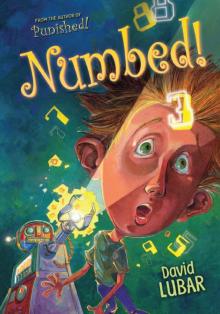 Numbed!
Numbed!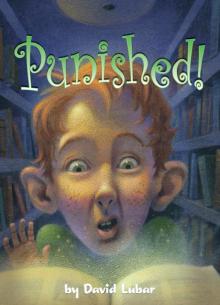 Punished!
Punished!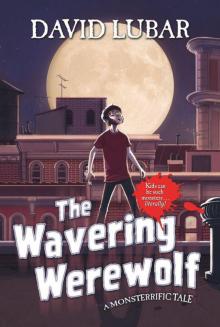 The Wavering Werewolf: A Monsterrific Tale (Monsterrific Tales)
The Wavering Werewolf: A Monsterrific Tale (Monsterrific Tales)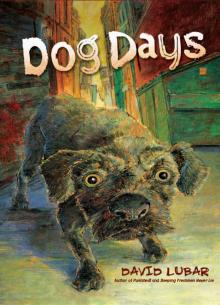 Dog Days
Dog Days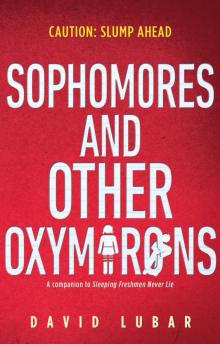 Sophomores and Other Oxymorons
Sophomores and Other Oxymorons The Psychozone
The Psychozone My Rotten Life
My Rotten Life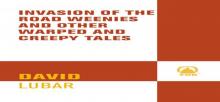 Invasion of the Road Weenies
Invasion of the Road Weenies In the Land of the Lawn Weenies
In the Land of the Lawn Weenies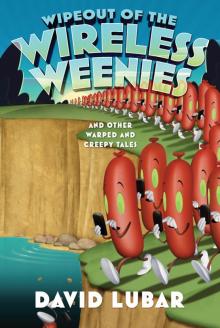 Wipeout of the Wireless Weenies
Wipeout of the Wireless Weenies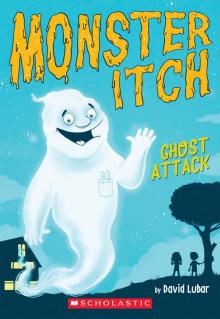 Ghost Attack
Ghost Attack Check Out the Library Weenies
Check Out the Library Weenies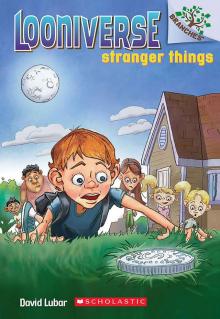 Looniverse #1: Stranger Things (A Branches Book)
Looniverse #1: Stranger Things (A Branches Book)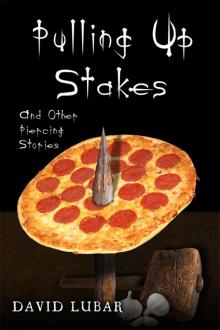 Pulling up Stakes and Other Piercing Stories
Pulling up Stakes and Other Piercing Stories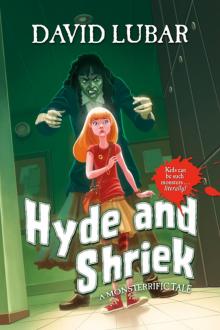 Hyde and Shriek
Hyde and Shriek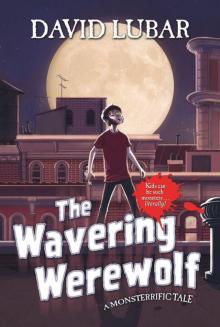 The Wavering Werewolf
The Wavering Werewolf Dead Guy Spy
Dead Guy Spy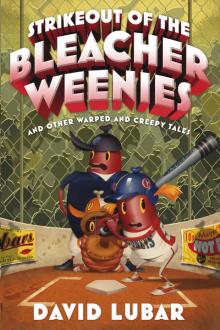 Strikeout of the Bleacher Weenies
Strikeout of the Bleacher Weenies The Big Stink
The Big Stink The Battle of the Red Hot Pepper Weenies
The Battle of the Red Hot Pepper Weenies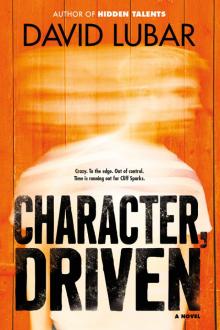 Character, Driven
Character, Driven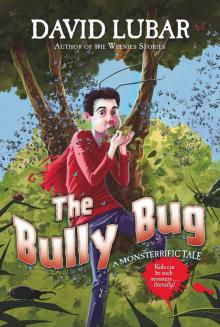 The Bully Bug
The Bully Bug Beware the Ninja Weenies
Beware the Ninja Weenies Extremities: Stories of Death, Murder, and Revenge
Extremities: Stories of Death, Murder, and Revenge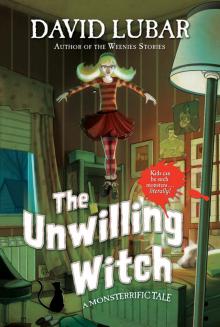 The Unwilling Witch
The Unwilling Witch Goop Soup
Goop Soup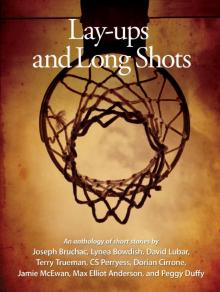 Lay-ups and Long Shots
Lay-ups and Long Shots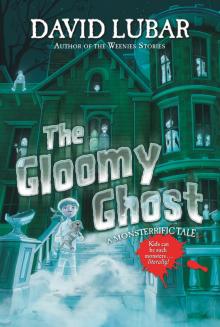 The Gloomy Ghost
The Gloomy Ghost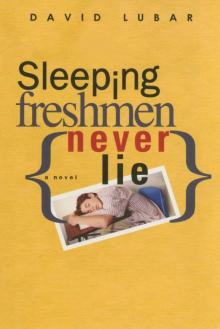 Sleeping Freshmen Never Lie
Sleeping Freshmen Never Lie Zero Tolerance Meets the Alien Death Ray and Other (Mostly) Inappropriate Stories
Zero Tolerance Meets the Alien Death Ray and Other (Mostly) Inappropriate Stories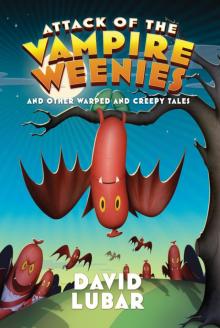 Attack of the Vampire Weenies
Attack of the Vampire Weenies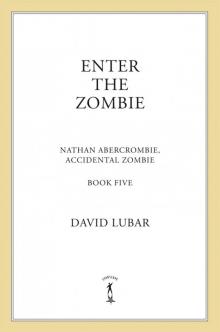 Enter the Zombie
Enter the Zombie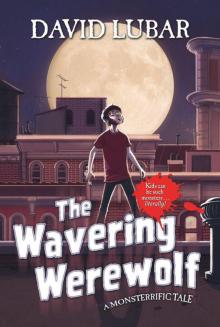 The Wavering Werewolf_A Monsterrific Tale
The Wavering Werewolf_A Monsterrific Tale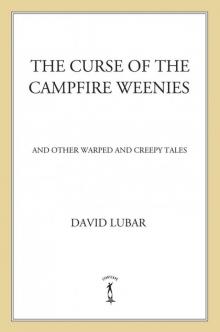 The Curse of the Campfire Weenies
The Curse of the Campfire Weenies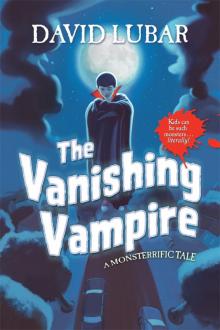 The Vanishing Vampire
The Vanishing Vampire